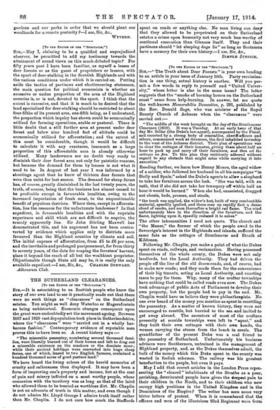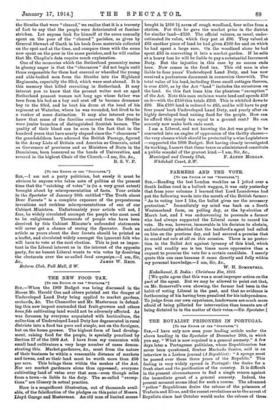[To in Roma or vs. .13racrvroo.1 Sin,—" The Truth about
Deer Forests" is your own heading to an article in your issue of January 10th. Party recrimina- tion is one thing, actual history is another. Will you per- mit a few words in reply to yourself and "United Univer- sity," whose letter is also in the same issue? The latter suggests that the "smoke of burning homes on the Sutherland coast" came from kelp-burning. In answer. let me quote the well-known Memorabilia Domestics, p. 291, published by the Rev. Donald Sage, who was minister of the Royal Bounty Church of Achness when the "clearances" were carried out :— "The middle of the week brought on the day of the Strathnaver Clearance (1819). It was a Tuesday. At an early hour of that day Mr. Seller (the Duke's law-agent), accompanied by the Fiscal, and escorted by a strong body of constables, sheriff-effieers and others, commenced work at Grumore, the first inhabited township to the west of the Achness district. Their plan of operations was to clear the cottages of their inmates, giving them about half an hour to pack up and carry off their furniture, and then set the cottages on fire. To this plan they ruthlessly adhered without regard to any obstacle that might arise while carrying it into execution."
Reading further, we learn how Henny Munro, the aged widow of a soldier, who followed her husband in all his campaigns "in Sicily and Spain," asked the Duke's agents to allow a shepherd to take her furniture across the loch. " She was told, with an oath, that if she did not take her trumpery off within half an hour it would be burned." When she had, unassisted, dragged out chests, beds, presses, and stools,
"the torch was applied, the widow's huh built of very combustible material, speedily ignited, and there rose up rapidly first a dense cloud of smoke, and soon thereafter a bright red flame. The wind unfortunately blew in the direction of the furniture, and the flame, lighting upon it, speedily reduced it to ashes."
The other inhumanities I need not quote. The church and "the Manse," the former of which the people owed to the Sovereign's interest in the Highlands and islands, suffered the same fate as the cottages of Strathnaver and Strath of Kildonan.
Following Mr. Chaplin, you make a point of what the Dukes spent on roads, railways, and reclamation. Having possessed themselves of the whole county, the Dukes were not only landlords, but the Local Authority. They had driven the people of[ the line of the old drove-roads, and, of course, had to make new roads ; and they made them for the convenience of their big tenants, acting as Local Authority, and exacting taxes to pay for them. Why, many of the crofter townships have nothing that could be called roads even now. The Dukes took advantage of public Acts of Parliament to develop their own property, but the people had to pay in the end. Mr. Chaplin would have ne believe they were philanthropists. No one ever heard of the money you mention as spent in resettling the peasantry. As a matter of known history, they were not encouraged to resettle, but hurried to the sea and incited to get away abroad. The ancestors of most of the crofters presently at seaside townships were left to " squat," and they built their own cottages with their own bands, the women carrying the atones from the beach in creels. The grandfather of the present Duke was a real friend to the peasantry of Sutherland. Unfortunately his business advisers were Southerners, untrained in the management of Highland property, and, as the Dukes themselves admit, the bulk of the money which this Duke spent in the county was wasted in foolish schemes. The railway was his greatest benefaction to the people, but even it pays.
May I add that recent articles in the London Press repre- senting the "cleared" inhabitants of the Straths as a poor, perishing, deteriorated people have given the deepest pain to their children in the North, and to their children who now occupy high positions in the United Kingdom and in the Dominions of the Empire? The writer has seen some very bitter letters of protest. When it is remembered that the officers and men of the illustrious 93rd Regiment were froni
the Straths that were "cleared," we realize that it is a travesty of fact to say that the people were deteriorated or famine- stricken. Let anyone look for himself at the sums annually spent on the poor of the " cleared " parishes, as given by General Stewart of Garth in his book from materials collected on the spot and at the time, and compare them with the sums now spent on the poor in the same parishes, and he will realize that Mr. Chaplin's data require much explanation.
One of the memories which the Sutherland peasantry nurse in gloomy anger is that the "clearances " did not begin until those responsible for them had coerced or wheedled the young and able-bodied men from the &II:the into the Highland Regiments, especially the 93rd, which were sent abroad. It is this memory that killed recruiting in Sutherland. It may interest you to know that the present writer met an aged Sutherland peasant woman not long ago whose father was torn from his bed as a boy and sent off to become drummer boy to the 93rd, and be beat his drum at the head of his regiment at Waterloo, where he was wounded, but lived to be a ranker of some distinction. It may also interest you to know that some of the families removed from the Straths were junior branches of distinguished Scottish houses. The quality of their blood can he seen in the fact that in the hundred years that have nearly elapsed since the " clearances " the grandchildren have adorned the British Peerage, figured in the Army Lists of Britain and America as Generals, acted as Governors of provinces and as Ministers of State in the Dominions, been honoured as the heads of Universities, and revered in the highest Chair of the Church.—I am, Sir, &o., R. S. V. P.











































 Previous page
Previous page